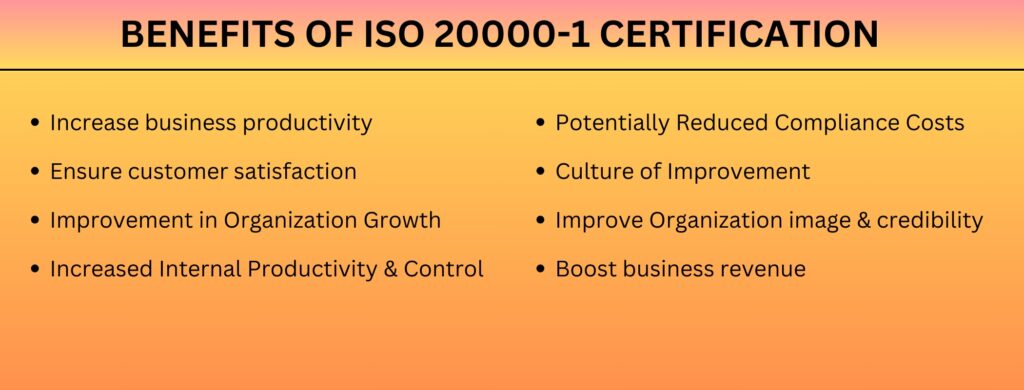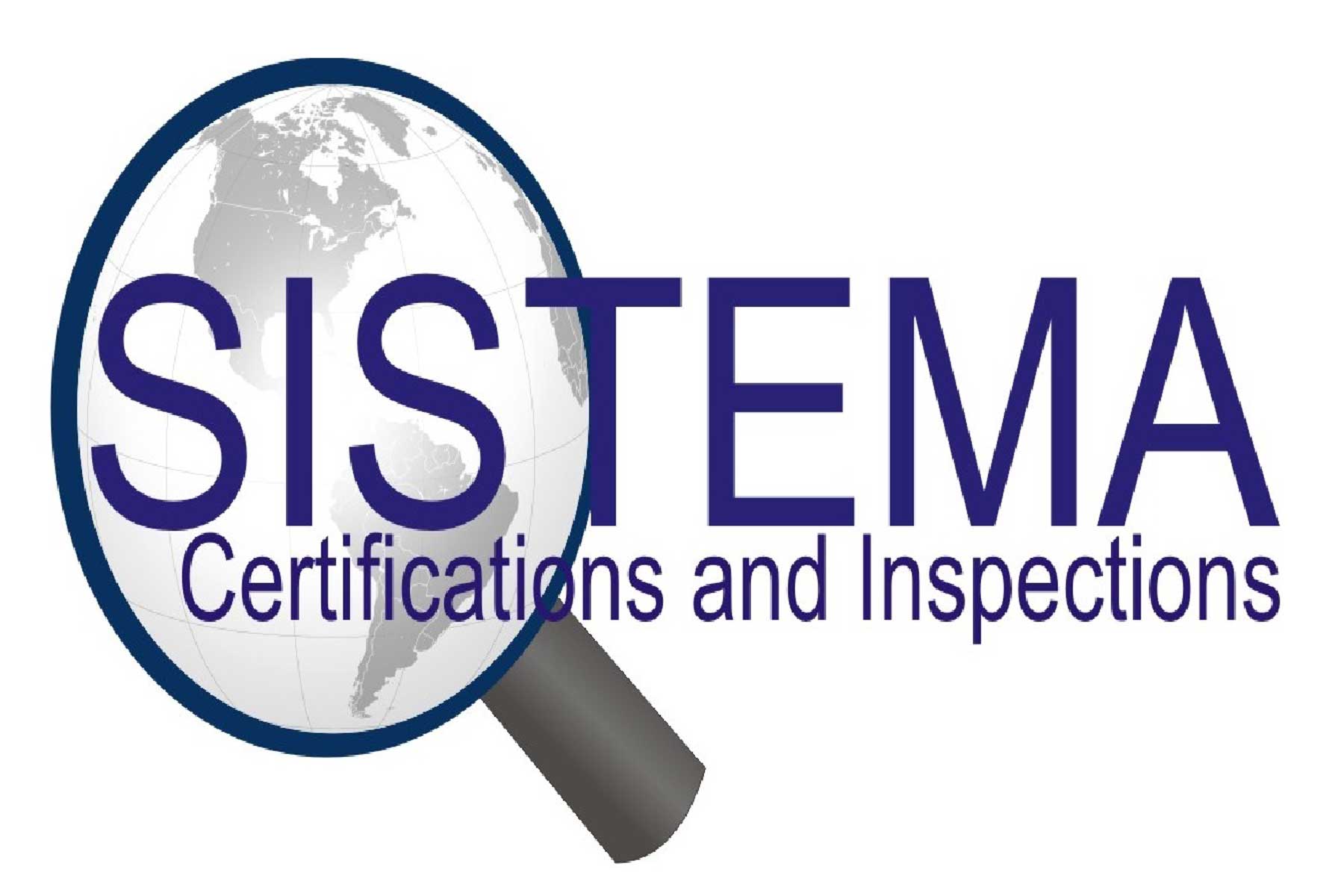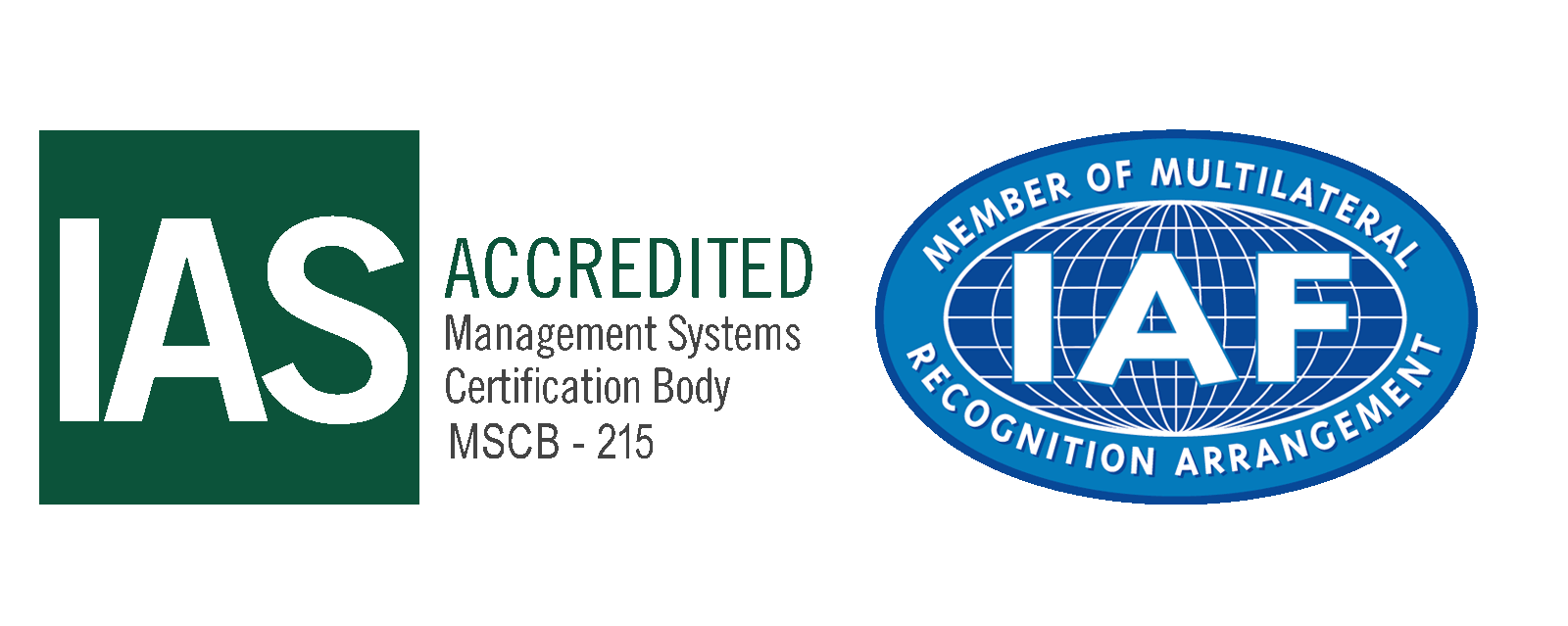ISO 20000-1 Certification
For Micro, Small, Medium and Large Organizations
Quality Sistema Certifications and Inspections
ISO 20000-1 Certification
Introduction
WHAT IS ISO 20000-1 CERTIFICATION?
ISO 20000-1 Certification is a globally recognized standard that outlines the requirements for establishing, implementing, maintaining, and continually improving an organization’s IT service management (ITSM) system. ISO 20000-1 Certification, developed by the International Organization for Standardization (ISO), is specifically designed to make sure that an organization’s IT services align with business objectives while adhering to best practices.
WHY IS ISO 20000-1 CERTIFICATION A GOOD IDEA FOR YOUR ORGANIZATION GROWTH?
Obtaining ISO 20000-1 Certification is a prudent strategy for fostering organizational growth. This globally recognized standard for IT service management (ITSM) make sure that an organization aligns its IT services with business objectives and follows best practices.
ISO 20000-1 Certification demonstrates a commitment to delivering high-quality IT services, enhancing customer satisfaction, and improving overall operational efficiency. By adhering to this standard, organizations can establish a robust ITSM framework, leading to increased reliability, streamlined processes, and better risk management.
Moreover, ISO 20000-1 Certification enhances an organization’s credibility in the marketplace, instilling confidence in clients and stakeholders. As a result, ISO 22000-1 certification serves as a valuable asset for attracting new business opportunities, improving customer trust, and ultimately contributing to the sustained growth of the organization.
HOW DOES ISO 20000-1 CERTIFICATION WORK?
ISO 20000-1 certification involves a structured process to make sure that an organization’s IT service management (ITSM) system complies with the established standards. The process typically includes several key steps. First, the organization assesses its existing ITSM processes and identifies areas that need improvement to meet ISO 20000-1 Certification requirements. Following this, the organization implements necessary changes and establishes a framework that aligns IT services with business objectives. A comprehensive documentation system is put in place to demonstrate adherence to the standard. Next, an accredited certification body conducts an audit to assess the organization’s compliance. This audit includes a review of documentation, interviews with key personnel, and an evaluation of implemented processes. If the organization meets the standard’s criteria, it receives ISO 20000-1 certification. To maintain certification, organizations undergo regular audits to ensure ongoing compliance and continuous improvement in IT service management practices. This certification process provides a systematic approach for organizations to enhance their ITSM capabilities, improve service quality, and demonstrate commitment to best practices in IT service delivery : –
- ISO 20000-1 certification involves a structured process to ensure that an organization’s IT service management (ITSM) system complies with the established standards. The process typically includes several key steps:-
- Assessment and Gap Analysis: The organization assesses its existing IT service management processes and identifies areas that need improvement to meet ISO 20000-1 standards.
- Implementation of Changes: Necessary changes are implemented to align IT services with business objectives. The organization establishes a framework that adheres to the requirements of ISO 20000-1:2018 Certification.
- Documentation: A comprehensive documentation system is put in place to demonstrate the organization’s commitment to the standard. This documentation includes policies, procedures, and records of ITSM processes.
- Pre-Audit Preparation: Before the formal certification audit, the organization conducts internal audits to ensure that implemented processes comply with ISO 20000-1:2018 requirements.
- Certification Audit: An accredited certification body conducts an audit to assess the organization’s compliance. This involves a thorough review of documentation, interviews with key personnel, and an evaluation of implemented ITSM processes.
- Certification Decision: Based on the audit findings, the certification body makes a decision on whether the organization meets the criteria for ISO 20000-1 certification.
- Issuance of Certification: If the organization meets the standard’s criteria, it is awarded ISO 20000-1 certification. This certification demonstrates that the organization’s ITSM system aligns with international best practices.
- Ongoing Audits: To maintain certification, organizations undergo regular audits, typically annually, to ensure ongoing compliance with ISO 20000-1:2018. These audits also encourage continual improvement in IT service management practices.
ISO 20000-1 Certification : Principles
-
Customer focus
- Leadership
- PDCA Cycle
-
Service Delivery
- Relationship Processes
- Process approach
- Risk-Management
-
Continual Imrpovements
- Evidence based thinking
ISO 20000-1:2018 Certification is grounded in several key principles that guide organizations in establishing effective IT service management (ITSM) systems. These principles include:
- Service Management System (SMS): Establishing and maintaining a robust Service Management System that provides the framework for planning, implementing, and continually improving ITSM processes.
- Continuous Improvement: Cultivating a culture of continuous improvement within ITSM processes, encouraging organizations to regularly assess and enhance their procedures to meet evolving business requirements.
- Alignment with Business Objectives: Ensuring that IT services directly contribute to and align with the broader organizational goals and strategies, emphasizing the integration of ITSM into the overall business framework.
- Risk Management: Incorporating risk management principles into ITSM to identify, assess, and manage risks associated with IT services, ensuring resilience and minimizing potential disruptions.
- Customer Focus: Prioritizing customer satisfaction by designing and operating ITSM processes with a customer-centric approach, exceeding or meeting customer expectations, and enhancing the overall customer experience.
- Leadership and Commitment: Demonstrating leadership commitment and involvement in ITSM processes, with top management providing necessary resources, support, and commitment to quality.
- Documentation and Control: Thoroughly documenting ITSM processes, policies, and procedures, and implementing control measures to ensure effective implementation and maintenance of documented processes.
- Performance Evaluation: Emphasizing the monitoring, measurement, analysis, and evaluation of ITSM performance using key performance indicators (KPIs) to assess effectiveness and efficiency.
- Legal and Regulatory Compliance: Ensuring compliance with applicable legal and regulatory requirements related to ITSM, including data protection, privacy, and other relevant laws and standards.
REQUIREMENTS OF
ISO 20000-1 Certification
ISO 20000-1 Certification specifies the requirements for an organization to establish, implement, maintain, and continually improve an effective Information Technology Service Management System (SMS). Here is an overview of the key requirements outlined in ISO 20000-1:2018
- Context of the Organization (Clause 5): Consider the internal and external issues that can impact the SMS, along with the needs and expectations of interested parties.
- Leadership and Commitment (Clause 6): Demonstrate leadership commitment, establish an ITSM policy, and define roles, responsibilities, and authorities for personnel involved in the SMS.
- Planning (Clause 7): Develop plans for various aspects of ITSM, including risk management, service management planning, and resource planning.
- Support (Clause 8): Provide the necessary resources, competence, awareness, communication, and documented information to support the operation of the SMS.
- Operation (Clause 9): Implement and control the ITSM processes, including incident management, service request management, and problem management.
- Performance Evaluation (Clause 10): Monitor, measure, analyze, and evaluate the performance of the SMS, using key performance indicators (KPIs) to assess effectiveness.
- Improvement (Clause 11): Identify opportunities for improvement, and implement actions to continually enhance the suitability, adequacy, and effectiveness of the SMS.
Benefits of ISO/IEC 20000-1 Certification for service providers –
ISO 20000-1:2018 Certification

ISO 20000-1 certification offers service providers numerous benefits, including improved service quality, enhanced customer confidence, and a competitive edge in the market –
- Enhanced Service Quality: ISO 20000-1 Certification ensures the implementation of effective IT service management processes, leading to improved service quality.
- Global Recognition: ISO 20000-1:2018 provides international acknowledgment, enabling service providers to access global markets and demonstrating a commitment to international standards.
- Competitive Edge: ISO 20000-1 Certification serves as a competitive differentiator, positioning service providers ahead of competitors in industries where clients prioritize certified organizations.
- Operational Efficiency: The standard encourages the implementation of efficient ITSM processes, resulting in streamlined operations, resource optimization, and increased efficiency.
- Customer Confidence: Certification instills confidence in customers and stakeholders, signaling a commitment to delivering reliable and high-quality IT services.
- Continuous Improvement: ISO 20000-1 promotes a culture of continual improvement, allowing service providers to adapt to evolving business environments and emerging technologies.
- Regulatory Compliance: Certification helps service providers ensure compliance with legal and regulatory requirements related to IT service management, a critical factor in industries with stringent compliance standards.
WHEN WAS ISO 20000-1:2018 PUBLISHED?
ISO 20000-1:2018, the latest version of the Information Technology Service Management (ITSM) standard, was published on September 15, 2018. This revision of the ISO 20000-1 Certification reflects updates and improvements to the requirements for establishing, implementing, maintaining, and continually improving an organization’s IT service management system. ISO 20000-1:2018 version emphasizes alignment with contemporary ITSM practices and provides organizations with a framework to enhance the quality and efficiency of their IT services in accordance with international standards.
WHY ORGANIZATIONS CHOOSE US FOR GET ISO 20000-1 CERTIFICATION?
Organizations may choose Quality Sistema Certification for ISO 20000-1 Certification due to its reputation for expertise and excellence in IT service management. Quality Sistema Certification might be recognized for its commitment to maintaining rigorous standards and ensuring compliance with ISO 20000-1 requirements. The certification body’s industry reputation, accreditation status, and a track record of successful certifications could make it a preferred choice for organizations seeking to enhance their IT service management practices. Additionally, if Quality Sistema Certification offers comprehensive services, such as training and ongoing support, organizations may view it as a valuable partner in achieving and maintaining ISO 20000-1 Certification . Ultimately, the decision to choose Quality Sistema Certification is likely driven by a combination of its credibility, industry recognition, and the specific needs and goals of the organizations pursuing ISO 20000-1 Certification.ISO 20000-1 Certification
Get Free Advice on Audit Process

To Make an appointment, contact us through telephone and email or you can fill the form above.
Our Experts will give you an immediate callback and provide you the necessary information to proceed with ISO 20000 Certification for your Business.
Get in Touch
ISO Standards
Global PREESENCE



